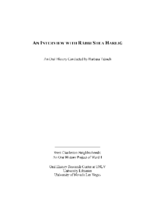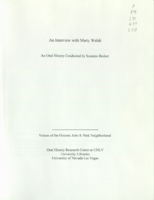Search the Special Collections and Archives Portal
Search Results

Transcript of interview with Flora Mason by Barbara Tabach, December 8, 2014
Date
Archival Collection
Description
Flora Mason (1940- ) is a Las Vegas, Nevada philanthropist and community leader. She was born Florica Esformes to a Sephardic Jewish parents who emigrated from Greece to New York. This Mediterranean influence can be seen in the meals she serves for the Jewish holidays. Flora?s grandfather had a pushcart business in New York and her father became a produce broker, which led the family to Miami, Florida. She graduated from high school in Miami and also met Stuart Mason there. The young couple married in 1958. They had been married for 58 years when Stuart passed away in 2012. In this oral history, Flora recalls her life?from witnessing signage that read: no blacks, no dogs, no Jews in the South to meeting her husband while a teenager to raising her three children in Las Vegas. Along the way, she has always found time to form fast friendships and to inspire productive community organizations. v For example, Flora and Stuart founded the Las Vegas Chapter of the Juvenile Diabetes Foundation in 1970. It was a disease that their daughter Deborah had suffered from. They also established the Mason Undergraduate Peer Coach Program at University of Nevada, Las Vegas Libraries in 2006. Flora was the first woman elected by the general membership to serve on the Temple Beth Sholom Board of Directors. She has served on the National Board of Directors of the Juvenile Diabetes Research Foundation, been involved with the Jewish Federation of Las Vegas, the Anti-Defamation League among many other Jewish and non-Jewish community organizations. Flora?s college education began at the University of Miami and focused on completing both her undergraduate and graduate degrees at UNLV, where she majored in English literature. She then became a lecturer in the UNLV English department from 1985 to 1993. Flora and Stuart Mason had three children: sons William and James who joined the family?s successful three-generation commercial construction business Taylor International, and daughter Deborah. In this oral history, Flora shares the joy of being a grandparent, her love of travel, and the opportunities of meeting Israeli dignitaries over the years. She also candidly reflects on dealing with grief and the Jewish rituals surrounding death.
Text

Transcript of interview with Dr. Ed Goldman by Barbara Tabach, March 22, 2016 and April 4, 2016
Date
Archival Collection
Description
In this interview, Goldman discusses the impact of strategies for addressing segregation in schools, including desegregation lawsuits, as well as anti-Semitism within the district. He also talks about his push, as region superintendent, for K through 8th grade configurations in schools as well as his opening of West Preparatory Institute, a K-12 school in Westside. Goldman discusses the politics of school naming and goes through the various community members who have schools named after them. In addition, he reflects upon how his job as a Clark County School District central office administrator has morphed over the years, and the different issues that demand his time over the years.
Edward ?Ed? Goldman was born in Rochester, New York in 1951, and spent his childhood in Jerusalem, Israel as well as Cincinnati, Ohio. He received his first bachelor?s degree in political science from Columbia University and a second in Jewish Studies from the University of Judaism. Goldman later received a master?s degree in political science from California State University, and then a doctorate in education and higher administration from UNLV, focusing on educational law. Goldman first moved to Las Vegas while on a leave of absence from his job in Los Angeles to finish his Ph.D. dissertation, working as a math teacher for the Clark County School District. However, it was not until 1981 that Goldman took a full-time position with the district, and moved with his wife, Susan, to the city. After the move, his first job was at Von Tobel Junior High School. Three years later he served as dean at Woodbury Junior High School. From 1989 until 2000, Goldman led recruitment for the school district, and subsequently, he became the Southeast Regent Superintendent. He then was asked to create a new division, Educational Services, which he oversaw for five years. He then took a break from central office administration, returning to the school environment, until he was asked to come back to his previous job as Associate Superintendent for Employee Management Relations.
Text

Transcript of interview with Rabbi Shea Harlig by Barbara Tabach, March 5, 2014
Date
Archival Collection
Description
Interview with Rabbi Shea Harlig by Barbara Tabach on March 5, 2014. In this interview, Rabbi Harlig discusses the Chabad movement of Orthodox Judaism and establishment of Chabad centers in Las Vegas and Southern Nevada. Rabbi Harlig talks about the property he has acquired for Chabad, and its outreach programs, including supervision of kosher kitchens in hotels. This interview was conducted for the Ward 1: West Charleston Neighborhoods oral history project, and therefore includes zoning and neighborhood discrimination issues, and a tour of the property.
Rabbi Shea Harlig arrived in Las Vegas in 1990 and settled in the Artesian Heights neighborhood of Las Vegas. As Director of Chabad of Southern Nevada, Rabbi Harlig focuses on religious outreach, education and social services, and has helped establish seven Chabad locations throughout the community and also built a school and educational program of the highest standards.
Text

Transcript of interview with Irwin Molasky by David G. Schwartz, April 23, 2014
Date
Archival Collection
Description
Interview with Irwin Molasky by David G. Schwartz, April 23, 2014. In this interview, Irwin Molasky discusses arriving in Las Vegas in the 1950s, and building the Pyramids motel on the Strip. He talks about the entertainers in various hotels on the Strip, the concept of the "star policy," and bringing Parisian shows to Las Vegas. He goes on to discuss his real estate developments, including Paradise Palms, Boulevard Mall, and Sunrise Hospital, and donating the land for the development of UNLV.
Irwin Molasky came to Las Vegas in 1951, during a time when "everyone knew everyone else," and there was a small, but strong Jewish community. An Army veteran, Irwin and his wife moved to Las Vegas after living in California for a short time. Irwin soon built The Pyramids, a Strip motel next to the Flamingo Hotel and Casino. The Pyramids opened the same day as its northern next-door neighbor, The Sands Hotel and Casino, on December 15, 1952. Irwin used his newly acquired contractor's license to become on the city's most important real estate developers. Over the next 60 years, he built everything from residential housing, including Paradise Palms to commercial properties. Projects included Sunrise Hospital and the surrounding medical buildings; Sunrise City Shopping Center and other power centers; Bank of America Plaza and much other downtown development; and golf courses. When the recession hit, Irwin began bidding on government projects across the country, successfully shielding his business and employees from the economic downturn. Irwin's real estate ventures not only had a tremendous impact on Las Vegas' economic development, but a substantial effect in social programming. Irwin donated 40 acres of prime real estate to the University of Nevada - Las Vegas (UNLV) so that university could expand. Additionally, he was the Founding Chairman of the UNLV Foundation and received an honorary doctorate in humanities.
Text

Transcript of interview with Natalie Wolf by Barbara Tabach, October 22, 2016
Date
Archival Collection
Description
During this interview, Natalie shares stories of operating the bus station, a brief ownership of Commercial Deli (1987-1990), and her long career working collections for the casino industry. Her first position was at the Tropicana Hotel and has worked for MGM Properties, a loyal employee at the Mirage since 1990, starting a few weeks after the casino opened.
Text

Transcript of interview with Richard "Curley" Francis by Connie Degernes, March 4, 1975
Date
Archival Collection
Description
On March 4, 1975, collector Connie Degernes interviewed truck driver and rigger, Richard L. (Curley) Francis (born on July 27, 1907 in Compton, California) in his home in Boulder City, Nevada. The main focus of this interview is the construction of the Hoover Dam. Mr. Francis discusses the various occupations he has held since relocating to Nevada, including, Cat Skinner, truck driver, cableway operator, rigger foreman, and crane operator. He also talks about working for the government and the Six Company in Las Vegas.
Text

Transcript of interview with Marty Walsh by Suzanne Becker, July 19, 2007
Date
Archival Collection
Description
In 2002, Marty Walsh and her husband purchased a home in the John S. Park Neighborhood. Three aspects attracted them to their 1941-built home: the quality construction; the aesthetics and details of the house; and the "old-fashion human element" that she associated with her grandparents. Marty describes their relocation to Las Vegas after living for nine years in Ireland and her joy of discovering the John S. Park community. For her there is a neighborliness that they found in the form of the Neighborhood Watch. She feels the neighborhood still has work to do, but the gentrification has had splendid results as new "urbanites" replace original homeowners. From her artist point of view, she also provides thoughts about the impact the artist community of musicians, painters, and creative artists has had on the neighborhood. Even though she is relatively new to Las Vegas, she is well researched in the historic aspects of John S. Park location: once a fertile plot of land where
Text

Transcript of interview with Bud Weil by Claytee White, December 9, 2003
Date
Archival Collection
Description
Bud Weil worked as a disc jockey in Mexico after serving in the military during World War II. In 1947, he moved to Las Vegas to work at KLAS but after two days he was job hunting. His search landed him at KENO, a radio station owned by Max and Laura Belle Kelch. His was an interview show that afforded him entree to stars performing in town. The list of his favorite interviews includes Sophie Tucker, Sammy Davis, Jack Benny, The Mills Brother, Rosemary Clooney, Leno Home, Joey Lewis and many others. In 1955, he became restless, left the career in broadcasting, and joined Max Kelch as a partner in a new venture for Las Vegas - Musak. This enterprise took him to the doors of every business in town and shortly, he knew everybody. He uses that knowledge in this interview to talk about all aspects of life as the town grew over the years. Today he is a senior statesman of our town, enjoying everything about Las Vegas except the traffic.
Text

Transcript of interview with Evelyn Miller McDonald by Maylene C. Cabatingan, February 26 & 27, 1980
Date
Archival Collection
Description
On February 26, and 27, 1980, Maylene C. Cabatingan interviewed Evelyn Miller McDonald (born 1905 in Alderson, West Virginia) about her life in Las Vegas, Nevada. Also present during the interview is Maylene’s step-father (name unknown) who occasionally participates in the conversation. At the time of the interview, McDonald had lived in Nevada for over seventy-two years and described early Las Vegas as a small-town railroad community with few amenities. McDonald discusses her occupational history, and how her father started the first car garage in Las Vegas. She goes on to talk about the impact of the Great Depression on Las Vegas and how Hoover Dam’s construction reduced the severity of the financial depression in comparison to other cities. She then recites the hotels that were built and the appeal that Vegas had to tourists and divorcees. McDonald later discusses how prostitution was accepted by the community, and recalls a story about how local businessmen rallied together to ensure that a minister would preach the funeral for a young woman who had died, despite being a prostitute. McDonald concludes her interview with a brief discussion of her goals in life and her pride in her daughters.
Text

Rosamond McDougal interview, February 14, 1979: transcript
Date
Archival Collection
Description
On February 14, 1979, Concepcion Fernandez interviewed Rosamond McDougal (born in Texas) about her life as a teacher in Las Vegas. McDougal speaks primarily about her time as a teacher in the Clark County School District, her unique class setup and the district’s changes. Moreover, McDougal speaks about the growing number of students and teachers, the superintendent’s role in bond issues, the courses offered, racial integration in the school district (and the casinos), and the building of the University of Nevada, Las Vegas. McDougal gives personal anecdotes about her family, her husband’s job at the Atomic Test Site and her time as an organ player in churches around the city. Lastly, she talks about recreational activities, Helldorado, the casinos and department stores.
Text
